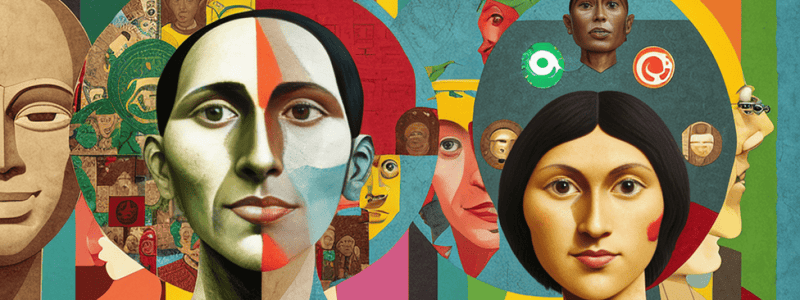Podcast
Questions and Answers
Which of the following is NOT a key aspect of cultural competence in counseling?
Which of the following is NOT a key aspect of cultural competence in counseling?
- Understanding the impact of cultural identity on individuals
- Studying prominent multicultural counseling theories (correct)
- Familiarizing with models and theories related to cultural competence
- Developing skills for effective cross-cultural communication
What is a primary focus when developing cross-cultural counseling skills?
What is a primary focus when developing cross-cultural counseling skills?
- Establishing trust with clients from diverse backgrounds (correct)
- Learning strategies for building rapport with clients of similar backgrounds
- Gaining knowledge of prominent multicultural counseling theories
- Understanding ethical guidelines related to cultural competence
Why is understanding the concept of cultural competence important in counseling?
Why is understanding the concept of cultural competence important in counseling?
- To effectively work with clients from diverse backgrounds (correct)
- To explore the impact of cultural identity on individuals
- To develop skills for conducting culturally sensitive assessments
- To gain knowledge of multicultural counseling theories
What should counselors familiarize themselves with related to legal considerations and obligations?
What should counselors familiarize themselves with related to legal considerations and obligations?
Which factor plays a significant role in shaping an individual's worldview according to the text?
Which factor plays a significant role in shaping an individual's worldview according to the text?
What do counselors need to develop for effective cross-cultural communication and counseling?
What do counselors need to develop for effective cross-cultural communication and counseling?
Which aspect is emphasized when studying methods for conducting culturally sensitive assessments?
Which aspect is emphasized when studying methods for conducting culturally sensitive assessments?
What should counselors understand in relation to ethical guidelines and cultural competence?
What should counselors understand in relation to ethical guidelines and cultural competence?
What is a key area for development in understanding the influence of cultural identity on individuals?
What is a key area for development in understanding the influence of cultural identity on individuals?
What knowledge is essential in gaining an understanding of prominent multicultural counseling theories?
What knowledge is essential in gaining an understanding of prominent multicultural counseling theories?
Which therapeutic approach validates and supports the experiences and identities of LGBTQ+ individuals?
Which therapeutic approach validates and supports the experiences and identities of LGBTQ+ individuals?
What does the term 'androgynous' refer to?
What does the term 'androgynous' refer to?
What is the acronym 'LGBTQ+' inclusive of?
What is the acronym 'LGBTQ+' inclusive of?
What does the Americans with Disabilities Act (ADA) of 1990 prohibit?
What does the Americans with Disabilities Act (ADA) of 1990 prohibit?
What is the process by which individuals or groups adopt the cultural traits of another culture to the extent that they become indistinguishable and integrated into that culture?
What is the process by which individuals or groups adopt the cultural traits of another culture to the extent that they become indistinguishable and integrated into that culture?
What does transference in counseling refer to?
What does transference in counseling refer to?
'Cultural norms' are shared expectations and rules that guide the behavior, beliefs, and values within a specific cultural group. They represent the accepted standards of behavior and social conduct that members of the culture consider appropriate and typical. Which term refers to a societal framework in which diverse cultural groups coexist, maintaining their distinct identities and contributing to the overall cultural landscape?
'Cultural norms' are shared expectations and rules that guide the behavior, beliefs, and values within a specific cultural group. They represent the accepted standards of behavior and social conduct that members of the culture consider appropriate and typical. Which term refers to a societal framework in which diverse cultural groups coexist, maintaining their distinct identities and contributing to the overall cultural landscape?
'Intersectionality' refers to what?
'Intersectionality' refers to what?
'Ageism' is best described as:
'Ageism' is best described as:
Study Notes
Cultural Competence in Counseling
- Cultural competence involves understanding, respecting, and appropriately responding to diverse cultural backgrounds.
- A primary focus in developing cross-cultural counseling skills is enhancing effective communication across different cultures.
- Understanding cultural competence is crucial as it ensures counselors provide respectful, relevant, and effective help to diverse clients.
Legal Considerations and Obligations
- Counselors must familiarize themselves with legal regulations related to confidentiality, informed consent, and discrimination.
- Legal considerations include ethical obligations to navigate cultural differences responsibly and sensitively.
Worldview and Cultural Identity
- Individual worldviews are significantly shaped by factors such as ethnicity, socioeconomic status, and personal experiences.
- Understanding cultural identity influences how clients perceive themselves and their interactions with the world.
Cross-Cultural Communication
- Counselors need to develop skills for active listening, empathy, and awareness of cultural nuances for effective cross-cultural communication.
- Conducting culturally sensitive assessments requires knowledge of cultural values and practices to ensure validity and reliability.
Ethical Guidelines
- Counselors should comprehend ethical guidelines in relation to cultural competence to navigate dilemmas effectively while respecting client backgrounds.
Multicultural Counseling Theories
- Essential knowledge in multicultural counseling theories includes understanding the context and application of various therapies for diverse populations.
Affirmative Therapeutic Approaches
- The affirming approach in therapy supports and validates the unique experiences and identities of LGBTQ+ individuals.
Definitions and Concepts
- 'Androgynous' refers to a blend of both masculine and feminine characteristics in behavior, appearance, or identity.
- The acronym 'LGBTQ+' includes Lesbian, Gay, Bisexual, Transgender, Queer/Questioning, and other sexual orientations and gender identities.
Legal Protections
- The Americans with Disabilities Act (ADA) of 1990 prohibits discrimination against individuals with disabilities in various areas, including employment and public services.
- Cultural assimilation describes the process where individuals or groups adopt cultural traits to the extent that they become indistinguishable from the mainstream culture.
Transference in Counseling
- Transference refers to clients projecting feelings, desires, and expectations from past relationships onto their counselor, impacting the therapeutic process.
Cultural Norms
- 'Cultural norms' encompass shared expectations and rules dictating appropriate behavior, beliefs, and values within a specific cultural group.
Intersectionality
- Intersectionality examines how various social identities (race, gender, class, etc.) intersect to shape individual experiences and systemic inequalities.
Ageism
- Ageism is best described as discrimination or prejudice against individuals based on their age, impacting both young and older generations.
Studying That Suits You
Use AI to generate personalized quizzes and flashcards to suit your learning preferences.
Related Documents
Description
Explore the concepts of cultural competence and cultural identity in counseling, including their importance and impact on individuals. Study models, theories, and influencing factors such as race, ethnicity, gender, sexual orientation, and socioeconomic status.




